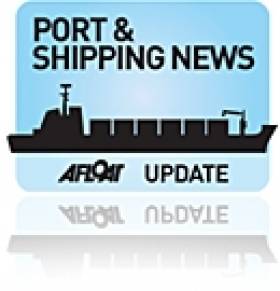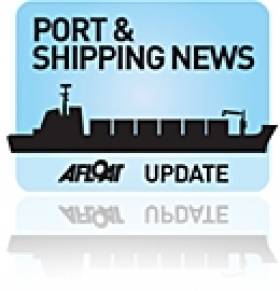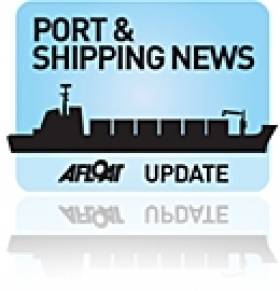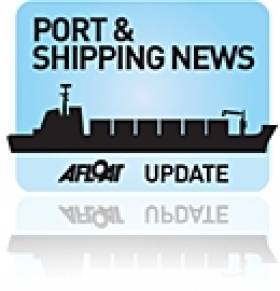Displaying items by tag: ASN
Newbuilds Expand Arklow Shipping Fleet
#NEWBUILDS-Two of the latest newbuilds for Arklow Shipping, one built in Spain and the second ship comleted from a South Korean shipyard, both entered service late last year and raises the fleet total to 44 vessels.
The northern Spanish built Arklow Forest became the 10th 'F' class vessel which was launched from Astilleros de Murueta SA. She is a 2,998grt vessel with a single-box hold with two portable bulkheads which can be placed into 10 positions for cargo separation. Her main engine plant is a MAN 6L27/38 2040kW gearbox with CPP, delivering about 12 knots.
Also entering service in late 2011 the Arklow Moor a 13,975dwt newbuild which formed the fifth in the series of 'M'-class vessels and she was built in South Korea by the Mokpo Shipyard Corporation. The class have four holds with a total grain capacity of 18,110 m3. They are fitted with a MaK 6M 43C main engine, 5,400kW, Jake reduction gearbox and Rolls Royce CPP which delivers about 14 knots.
Both newbuilds are registered in their owner's homeport and are Irish flagged. Of the 44-strong fleet, the majority of vessels (34) are managed by Arklow Shipping and the balance of vessels (11) are run by Arklow Shipping N.V.
Arklow Vessel Sets Record Cargo for Drogheda Port
#PORTS & SHIPPING – Drogheda Port set a record tonnage cargo with the arrival of Arklow Bridge (2011/4,723grt) last week. The vessel operated by Arklow Shipping N.V. as previously reported on Afloat.ie had carried 7,125 tonnes of maize, the largest ever single cargo handled in the Co. Louth port, writes Jehan Ashmore.
Arklow Bridge is the second 'B' class vessel that was built last year and the Dutch-flagged vessel loaded the cargo of maize in the Polish city of Gdynia for Comex McKinnon. The company is a leading player in the importation and trading of feedstuffs for the animal feed sector in Ireland.
Stevedoring services were handled by Fast Terminals, a new company which is a joint venture between Drogheda Port Company and Fast Shipping of Antwerp. The company became operational last Septemberand increases the number of stevedoring operations in the port to four.
Drogheda Port is developing its agri-sector business so to transport feedstuffs for the animal feed sector in Ireland. The agri-food sector is worth €7.8bn and is proving resilient, despite the downturn and growth from this indigenous sector will be vital to the country's overall economic recovery.
According to Drogheda Port Company, planning permission was recently received for the development of a 5,400sq m bulk storage facility at the Tom Roes Point Terminal. The downriver facility is situated closer to the open sea compared to the towns quays on the banks of the Boyne.
Mr Paul Fleming, Drogheda Port Chief Executive said "Drogheda Port continues to provide a strategic import and export location for our customers with a service which is more flexible and cost competitive than other larger ports".
He added: "This is helping us to win new contracts and grow our business in addition to providing a platform to Ireland's importers and exporters to reach their markets more cost competitively."
Mr Simon Mulvany, Director of Fast Terminals said "Fast Terminals has identified the competitive opportunities that Drogheda Port can offer our company. Despite the current economic downturn we intend to invest in the port and develop our facilities to cater for further growth in the future."
New Arklow Bulker Docks In Dublin to Load at Tara Mines Facility
She has a gross tonnage of 2,998 and a single-box hold with two portable bulkheads which can be placed into 10 positions for cargo separation. At 4,800 dwt, ship is certified for the carriage of dangerous goods of IMO Class 4.1, 4.2, 4.3, 5.1 and 5.2 (packaged) as well as general bulk cargoes. The main engine is a MAN 6L27/38 2040kW gearbox with CPP, delivering about 12 knots.
The 89m Arklow Forest was one of the 4,500 dwt 'R' class designs but was modified to allow carriage of a further 300 tonnes of cargo. She follows Arklow Field (PHOTO) which entered service this year and to read a report on another F class, Arklow Future click HERE.
Arklow Shipping Ltd with its headquarters in Co. Wicklow operate the fleet which in the majority are Irish registered. Some vessels though are managed through Dutch subsidiary Arklow Shipping Netherland B.V. based in Rotterdam where they are also registered in that port.
The Future’s Green, Bright and Orange
This month ASN are due delivery of the 4,700 gross tonnes Arklow Bridge, the second 'B' class newbuild was also built by the Dutch company of Bodewes Shipyards B.V. She is the fifth vessel to carry this name since Arklow Shipping was founded in 1966.
The Arklow Bridge is registered in St. John's the capital of the Caribbean island of Antigua where she will be flagged. Antigua became an associated state of the Commonwealth until it was disassociated from Britain 30 years ago.
Her sister Arklow Brook entered service this year and is designed with two holds with a total (grain and bale) capacity of 9473.1m3 or an equivalent of 33,4524 ft3.
For cargo-separation the holds can be sub-divided by a portable bulkhead in up to 8 positions. In addition to carrying agricultural-based cargoes, the 116m (OA) overall long vessel can handle 177 (TEU) containers in the hold and another 88 can be stowed on top of the hold's hatch covers. Both the holds are fitted with dehumidifier's.
The power-plant is derived from a MaK 6M32C 2999kW main engine with a Renk gearbox and Berg controllable pitch propeller that provides around 12 knots.
With the entry of Arklow Bridge, the combined fleet is over 40 ships that trade in the north-west of Europe and the Mediterranean. For further vessel statistics of the sisters click here and for a photo of the new vessel click this link.
Asides the Rotterdam based operation of ASN, the Irish side of the company is the largest indigenous owned shipping company in terms of Irish-flagged and registered tonnage. Arklow is not only the headquarter's of ASL but the homeport is also where the vessels are registered.
- Dublin Port
- Co. Wicklow
- Arklow Shipping
- Newbuilds
- The Netherlands
- Arklow Shipping Ltd
- Ports and Shipping News
- Caribbean
- DryDock
- Antigua
- British
- Dublin Port news
- Arklow Bridge
- Arklow Brook
- ASN
- Arklow Shipping B.V.
- Irishflagged
- Irishregistered
- Arklow Future
- Bodewes Shipyards
- Dutchflagged
- Antiguaflagged
- Mak
- The Commonwealth
- River Avoca






























































